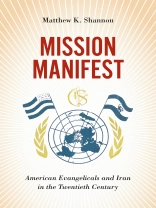In Mission Manifes t, Matthew Shannon argues that American evangelicals were central to American-Iranian relations during the decades leading up to the 1979 revolution. These Presbyterian missionaries and other Americans with ideals worked with US government officials, nongovernmental organizations, and their Iranian counterparts as cultural and political brokers—the living sinews of a binational relationship during the Second World War and early Cold War.
As US global hegemony peaked between the 1940s and the 1960s, the religious authority of the Presbyterian Mission merged with the material power of the American state to infuse US foreign relations with the messianic ideals of Christian evangelicalism. In Tehran, the missions of American evangelicals became manifest in the realms of religion, development programs, international education, and cultural associations. Americans who lived in Iran also returned to the United States to inform the growth of the national security state, higher education, and evangelical culture. The literal and figurative missions of American evangelicals in late Pahlavi Iran had consequences for the binational relationship, the global evangelical movement, and individual Americans and Iranians.
Mission Manifest offers a history of living, breathing people who shared personal, professional, and political aims in Iran at the height of American global power.
Tabela de Conteúdo
Introduction
1. The ‘Errand’ to Iran: Mission and Place in Transnational History
2. ‘Into the Commonwealth Stage’: The Old Mission of the Evangelical Church
3. ‘Spiritual Lend Lease’: Literacy, Social Work, and the New Mission for Development
4. ‘Something Other than the Ordinary Education’: International Schools in Pahlavi Iran
5. ‘These Young Persian Friends of Mine’: Associationalism in U.S.-Iran Relations
6. The Persian ‘Boomerang’: The Presbyterian Mission in the United States
7. ‘Build it for the Eye of God’: The American Colony, Mission, and Place after 1965
Conclusion
Sobre o autor
Matthew K. Shannon is Associate Professor of History at Emory & Henry College. He is the author of Losing Hearts and Minds, and editor of American-Iranian Dialogues.












